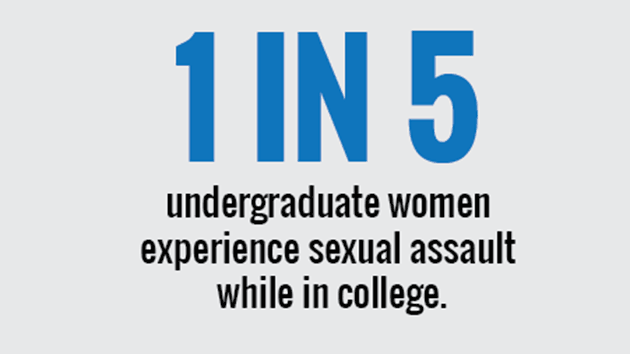
Ric Feld/AP
Earl Ehrhart is worried about his sons. Two of the boys attend Georgia public universities, and Ehrhart, a state representative from the Atlanta suburbs, has heard all about the college sexual-misconduct hearings in which young men are presumed guilty until proven innocent. The proceedings are flawed, he says, they’re like “kangaroo courts.” And their rulings are so biased against the accused, Ehrhart fears that his boys—as with male students across the state—could end up expelled based on a false accusation of rape.
That’s why, in April, the Republican lawmaker and his wife sued the US Department of Education and its Office for Civil Rights, arguing that federal guidelines for how colleges should adjudicate sexual assault cases are biased against men. According to the Ehrharts, the guidelines have made it easy for universities to “micromanage student sex lives” and “brand more students ‘rapists.'” The result? “Severe, unwarranted and permanent damages to male students.” If either of the boys were to be accused of sexual assault, they said, the consequences for their family could be dire: “The money [the Ehrharts] have saved for college tuition and expenses could be lost, and their son’s reputation and career prospects irreparably damaged.”
Their case is part of a wave of lawsuits filed in recent months attacking the government’s authority to interpret Title IX in ways that protect potential sexual-assault victims. Last week, a former University of Virginia law student sued the government on a similar claim, in a case funded by the Koch-backed Foundation for Individual Rights in Education. According to dozens of law professors, the arguments in these lawsuits have merit. Just one of these cases, if successful in court, could undermine five years of progress fighting rape on campus.
Those reforms began in April 2011, when Vice President Joe Biden announced that the Obama administration would strengthen its response to sexual assault among college students. That day, the Department of Education’s Office for Civil Rights sent what’s known as a “Dear Colleague” letter to universities across the country, offering guidance on schools’ obligations to address sexual violence under Title IX, which prohibits sex-based discrimination. (The office sent a similar directive this spring to protect transgender students’ access to bathrooms). The letter warned universities that they could lose federal funding if they did not comply with Title IX, leading schools to rewrite their sexual misconduct codes to match the guidance.
The result, say critics like Ehrhart and Andrew Miltenberg, his lawyer who is dubbed the “go-to attorney” on these issues, was an “overcorrection,” with schools adopting hearing processes that often lacked basic protections for accused students: The evidence had only to show that an assault was “more likely than not” to have occurred, and alleged perpetrators had no right to cross-examine the person who reported them. Supporters of the reforms say the changes have led students across the country to report sexual assaults to their schools in higher numbers than ever. But the Ehrharts’ lawsuit points to the expense: “Colleges have spent millions to hire lawyers, investigators, case workers, survivor advocates, peer counselors, workshop leaders and other officials to deal with increasing numbers of these complaints,” it notes, adding that one hires dozens of student counselors to “listen to their peers and report on what they deem distress.”
The lawsuit is just the latest move by Ehrhart, a longtime politician and former national director of the American Legislative Exchange Council—a network of conservative state legislators and corporate lobbyists who draft legislation—to position himself as a champion for the rights of accused male students. “He wanted to be, for lack of a better phrase, a leader,” Miltenberg says in an interview.
Ehrhart began his efforts last year, when a Georgia resident, the mother of an accused student, contacted him. Her story had many the hallmarks of a typical case: a fraternity party, an accusation that came months after the incident, limited or no physical evidence. Her son had been expelled from Georgia Tech in April 2015, and she hoped that since Ehrhart chairs the committee that controls funding for state universities, he might intercede on her son’s behalf. “[He] was robbed of his past and future, labeled and marked for the rest of his life,” she wrote. “We as a family have been living a nightmare.” In a complaint the student later filed against the school, he alleged that the lead investigator relied on “gossip” to determine guilt and discounted friendly text messages with the woman that he provided as evidence that there was no wrongdoing. Still, Georgia Tech President Bud Peterson and the Board of Regents denied his appeals. The young man had lost hope of transferring to another school or finding a job, according to his mother.
The story, Ehrhart says in an interview, “affected me like nothing has affected me in a 30-year legislative career.” He called meetings with university officials, seeking information on how the university handled that case and others. One of them was Miltenberg’s client, a male student accused of sexual assault more than a year after the alleged incident and expelled, he claims, with little opportunity to defend himself. (The student was reinstated on campus in January.) Another was a fraternity accused, twice, of racial harassment and put on probation. Ehrhart—a fraternity man himself—found it unacceptable to punish the entire group of men. (“These young men have lost an entire half-year of their college experience,” he told the Atlanta Journal-Constitution. “You spend a lot of time and effort and money to get into a fraternity.”)
Digging into these cases, Ehrhart was appalled. Accused male students, he says, were not granted “any due process whatsoever,” and were unable to face down student misconduct allegations with the same protections they’d have in the criminal justice system: a lawyer, a jury of peers, and the right to cross-examination. “The more I dug,” he says, “the more I uncovered a culture of allegation equals conviction.” But when he questioned their procedures, Ehrhart says, administrators threw up their hands, telling him they risked losing federal funding if they did not follow the government’s guidance on how to investigate campus rape reports and administer student discipline.
In January, Ehrhart called a public hearing of the committee that controls the Georgia university system’s funding. Before an audience of university staffers and members of the accused Georgia Tech fraternity, the mother who had first contacted Ehrhart told the story of her son’s expulsion. (Ehrhart, sensitive to her emotional wellbeing, exempted her from questioning.) Then Georgia Tech President Bud Peterson took the stand, flanked by two of his top administrators. Ehrhart grilled Peterson on the university’s student-misconduct procedures, leaving Peterson stuttering with nerves. Then Ehrhart turned to the other state university presidents in the hearing room. “You think you’ve got an issue with federal bureaucrats threatening your federal funds? This committee controls your funds,” he said, wagging his finger. “If you don’t protect the students of this state with due process, don’t come looking for money—period.”
The next week, Georgia Tech dropped a $47 million state funding request to renovate its library.
“They listen to the federal government over their funding? They needed to listen to me,” Ehrhart says. (According to Georgia Tech’s website, the funding request was put on hold to allow time for additional fundraising.)
But if anyone has taken the lead in fighting against the government’s prescriptions for solving the country’s campus rape crisis, it’s Miltenberg himself, who has spent the last two years representing approximately 100 college men in all stages of the campus discipline process, including the student reinstated at Georgia Tech. Only in the last few months, as his caseload continued to mount and judges began ruling in favor of accused students, has it become clear to him that discrimination against men in campus sexual assault proceedings is a nationwide problem.
“I started to think that the only way to really get at this is not to fight each case separately, but to attack the core of the problem,” he says. And the core of the problem, he believes, was government’s sexual-assault guidance from 2011. Miltenberg honed in on a technicality: Was the Department of Education really authorized to enforce such extensive “guidance” as part of Title IX law without putting it through formal policymaking procedures? OCR maintains that the measures were already required under Title IX when the agency issued the letter—the document simply articulated them. Before 2011, “there was a really big disconnect in what the law required and how much colleges and universities were aware about what the law required,” says Erin Buzuvis, a Title IX expert and law professor at Western New England University. But Miltenberg and other opponents of the Dear Colleague Letter, including Sen. James Lankford (R-Okla.) and law professors at Harvard and elsewhere, believe the document went beyond existing law, effectively creating new regulations.
Miltenberg spent two months looking for a plaintiff who could win. Then he found Grant Neal. A football player at Colorado State University-Pueblo who was suspended after the school found him guilty of sexual misconduct last December. According to his lawsuit, after Neal had consensual sex with a female student, a third student heard about the encounter and reported him for rape. At first, the alleged victim said she did not consider the incident a sexual assault, the complaint alleges, though she later came to believe it was after her supervisors “coerced [her] into believing something inappropriate had in fact occurred.” Neal claims the university’s investigator conducted a “one-sided and biased investigation,” preventing him from presenting evidence in his defense and challenging witnesses against him. He will remain suspended until she graduates.
While Neal’s complaint targeted the university, it also named the federal government as a defendant, alleging that he was only found guilty because the school felt obligated to uphold the 2011 guidelines. Around the same time, after meeting with the Ehrharts, Miltenberg filed their suit as well. Miltenberg’s two cases ask the judge to declare the letter and all sexual misconduct findings arising from it “unconstitutional, arbitrary and void.” Add to these cases a third: In April, FIRE announced that it was seeking an accused student willing to sue OCR on similar grounds: government overreach. Then, last Thursday, a University of Virginia law student filed suit, claiming the letter caused his school to find him guilty based on the “preponderance of the evidence.”
If any of these challenges succeed, according to law professor Buzuvis, the ruling could prevent the government from holding universities to its standards—undermining OCR’s 244 open investigations of schools for mishandling sexual-assault cases. And it could potentially prompt more accused male students to sue their schools, challenging any sexual-assault finding that was made according to the letter’s guidelines.
Meanwhile, Ehrhart is headed toward an election for his fourteenth term in office. Under pressure from his actions, state colleges and universities in Georgia are preparing to amend their sexual misconduct codes to protect accused students—granting them rights to an attorney, to present evidence in their defense throughout the process, and to challenge investigators for showing bias. Hearings will still use the “preponderance of the evidence” standard to determine when a violation has occurred, but additional “substantive evidence” will be required to suspend or expel an accused student. Some students have spoken out against the new rules: “I am concerned that Rep. Ehrhart has now bullied you too,” Kate Napier, a Georgia Tech junior, told the state Board of Regents in March. “When I look at the policy, I see an effort to make the reporting, investigation and decision-making process as cumbersome as possible.”
The new codes will go into effect next month. And, as part of his role managing education dollars, Ehrhart has begun talking about granting Georgia Tech’s stalled $47 million library request. “We need to provide—in the vernacular of today’s college—a safe space,” he said at the hearing, “for every one of these kids.”
This article has been updated.













